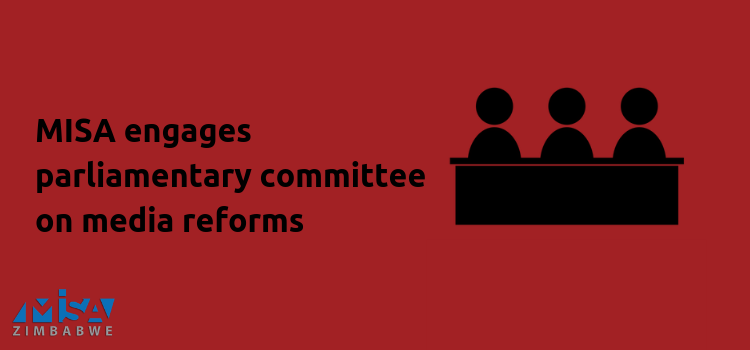MISA Zimbabwe in partnership with the Media Alliance of Zimbabwe (MAZ) on 27 and 28 June 2019 held an intense two-day workshop with the Parliamentary Portfolio Committee on Information, Media, and Broadcasting Services in Gweru in Zimbabwe’s Midlands Province. The workshop was convened to familiarise Committee Members with the proposed laws meant to replace the Access to Information and Protection of Privacy Act (AIPPA).
This came at a time when government has conceded to MISA Zimbabwe’s long held assertion that AIPPA is a misnomer when viewed against the principles of access to information, privacy, and media freedoms enshrined in the 2013 Zimbabwe Constitution.
The Ministry of Information, Media and Broadcasting Services is spearheading efforts to replace AIPPA with the Freedom of Information Act, the Protection of Personal Information Act, and the Zimbabwe Media Commission Act. Repealing AIPPA will also require amendment of the existing Broadcasting Services Act.
So far, the ministry has released three of the four proposed draft Bills into the public domain, namely the draft Freedom of Information Bill, the draft Zimbabwe Media Commission (ZMC) Bill, and the draft Broadcasting Services Amendment Bill.
Discussions over the two days centred on determining and measuring the extent to which the proposed laws conform to the 2013 Constitution.
Lawyers Cris Mhike, Tafadzwa Mugabe and MISA Zimbabwe Legal Officer Kuda Hove took the Committee through the proposed Bills highlighting respective contentious provisions that the Committee should be on the lookout for ahead of the tabling of the Bills before Parliament and subsequent public hearings.
Draft Zimbabwe Media Commission Bill
The ZMC Bill, in particular was subjected to immense scrutiny and discussions owing to its draconian provisions that seek to criminalise the media profession as well as its ambiguity on the issue of media self-regulation.
The Zimbabwe Media Commission (ZMC) is an independent Commission tasked with, among other obligations, ensuring a free and democratic media environment in Zimbabwe. Unlike other independent Commissions such as the Zimbabwe Human Rights Commission, established through Chapter 12 of the Constitution, the ZMC was originally established in terms of Part VII of AIPPA. The Zimbabwe Media Commission Bill seeks to rectify this anomaly. However, the draft Zimbabwe Media Commission Bill still contains provisions that contravene the Constitution.
For example, the Bill still criminalises journalistic activities by permitting the involvement of police in the investigation of matters brought before the Commission. While proceedings before the Zimbabwe Media Commission are not and should not be criminal in nature, involvement of the police in any matter raises the spectre of criminality on a journalistic case or matter under investigation.
More importantly, discussions on the Bill in question, revealed its current silence on the establishment of a media self-regulatory mechanism. MAZ rightly argues that the media, as is the case with any other profession, must be afforded the opportunity to self-regulate. For instance, the Law Society of Zimbabwe regulates the legal profession in Zimbabwe, a self- regulatory mechanism established in terms of the Legal Practitioners Act.
The Constitution permits the Zimbabwe Media Commission to delegate some of its regulatory powers to another body established in terms of an Act of Parliament. However, the draft Bill is silent on this delegation of powers vesting all the regulatory powers of the country’s media with the ZMC.
Draft Broadcasting Services Amendment Bill
Meanwhile, the draft Broadcasting Services Amendment Bill, proposes slight if not cosmetic changes to the existing Broadcasting Services Act. For example, it limits foreign investment in the broadcasting sector to 20% and outlaws donations for community radio stations. It was also criticised in the context of its definition of “foreigner.” The current Bill’s definition excludes Zimbabwean citizens not domiciled in the country.
Draft Freedom of Information Bill
However, the draft Freedom of Information Bill is a relatively progressive bill that seeks to give life to the enjoyment of the right to access information as found in Section 62 of the Constitution. The Bill is a marked improvement when compared with the current access to information provisions found under AIPPA.
For example, the draft Bill calls for the appointment of information officers within every public entity. Information officers will be responsible for receiving and dealing with requests for access to information.
The draft Bill further states that information officers have a duty to inform members of the public of their right to access information and how this right can be exercised. However, the Bill lacks any punitive measures in instances where information officers or entities that hold information do not abide with the terms of the proposed Freedom of Information law.
This is problematic because experience shows that the biggest hurdle to accessing information is not necessarily because of the lack of enabling access to information laws, but the indifference if not hostility of those tasked with giving information against members of the public who request for information or seeking services from public institutions. MISA Zimbabwe therefore, recommends the institution of orientation programmes for information officers to change mindsets, attitudes, culture and nature of interactions between public representatives and members of the public.
Chairperson of the Committee, Honourable Prince Sibanda, commended MISA Zimbabwe and MAZ for taking them through the Bills saying that they were now more knowledgeable in terms of what is at stake. He pledged that the Bills would not sail through parliament without being subjected to due scrutiny.
Meanwhile, it is not yet clear as to when exactly the draft Bills will be finalised and tabled for debate before Parliament. Initially, Nick Mangwana, the Permanent Secretary in the Ministry of Information, Media, and Broadcasting Services, said his ministry would table the four Bills before Parliament in late April or early May this year, but this did not happen.
End









